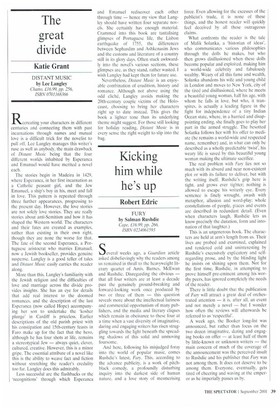The great divide
Katie Grant
DISTANT MUSIC by Lee Langley Chatto, £16.99, pp. 256,
ISBN 0701168366
Recreating your characters in different centuries and connecting them with past incarnations through names and mutual love is a difficult trick for the novelist to pull off. Lee Langley manages this writer's ruse as well as anybody, the main drawback of Distant Music being that the four different worlds inhabited by Esperanca and Emanuel would have merited a novel each.
The stories begin in Madeira in 1429, where Esperanca, in her first incarnation as a Catholic peasant girl, and the Jew Emanuel, a ship's boy in his, meet and fall in love. This pattern is repeated through three further appearances, progressing to the present day. However, the love stories are not solely love stories. They are really stories about anti-Semitism and how it has shaped the Western world. The characters and their fates are created as examples, rather than existing in their own right, though they are none the worse for that. The fate of the second Esperanca, a Portuguese aristocrat who marries Emanuel, now a Jewish bookseller, provides genuine suspense. Langley is a good teller of tales and Distant Music easily carries the reader along.
More than this. Langley's familiarity with the Jewish religion and the difficulties of love and marriage across the divide provides insights. She has an eye for details that add real interest to the doomed romances, and the description of the last Esperanca (now called Hope) accompanying her son to undertake the 'kosher plunge' in Cardiff is priceless. Earlier descriptions of the old parish priest with his constipation and 15th-century feasts in Faro make up for the fact that the hero, although he has four shots at life, remains a stereotypical Jew — always quiet, clever, cultured, creative. However, this is a minor gripe. The essential attribute of a novel like this is the ability to weave fact and fiction without stretching the reader's credulity too far. Langley does this admirably.
Less successful are the flashbacks or the 'recognitions' through which Esperanca and Emanuel rediscover each other through time — hence my view that Langley should have written four separate novels. She certainty has enough material. Crammed into this book are tantalising glimpses of Portuguese life, the Lisbon earthquake of 1755, the differences between Sephardim and Ashkenasim Jews and the customs and literature of a country still in its glory days. Often stuck awkwardly into the novel's various sections, these glimpses are, as they stand, rather wasted. I wish Langley had kept them for future use.
Nevertheless, Distant Music is an enjoyable combination of erudition, history and romance. Although not above using the odd cliché, Langley avoids making the 20th-century couple victims of the Holocaust, choosing to bring her characters right up to date instead. This gives the book a lighter tone than its underlying theme might suggest. For those still looking for holiday reading, Distant Music is in every sense the right weight to slip into the bag.


























































 Previous page
Previous page